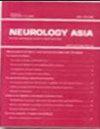Gene Xpert MTB/RIF assay in patients with clinical suspicion of tuberculous meningitis
IF 0.2
4区 医学
Q4 CLINICAL NEUROLOGY
引用次数: 0
Abstract
Early diagnosis and treatment of tubercular meningitis (TBM) is one of the best predictors of survival. The smear testing of the cerebrospinal fluid (CSF) has a low sensitivity and cultures, though having higher sensitivity, take a long time in TBM diagnosis. The present study was done to evaluate the proportion of positive Gene Xpert test, a rapid nucleic acid amplification test, in clinically suspected patients with TBM. The results of Gene Xpert tests were then compared with the culture results. One hundred and fifty prospective patients with a clinical suspicion of TBM were classified as probable or possible TBM and underwent CSF examination for culture and Gene Xpert assay. Out of 124 patients available for statistical evaluation, 52 were in the probable and 72 in possible TBM group. The proportion of patients with Gene Xpert positivity were significantly more in probable compared to possible TBM (63.15% vs 36.85%, p<0.001). Twenty-eight patients had a positive culture result. The sensitivity of Gene Xpert relative to culture testing was 68.42%, specificity of 97.61%, a positive predictive value of 92.85% and a negative predictive value of 87.23%. Gene Xpert testing provided a rapid diagnosis in patients suspected with TBM. The high sensitivity and specificity of this test relative to culture testing is a strong indication that it should be included as one of the gold standard tests in patients with suspected TBM.临床怀疑结核性脑膜炎患者的基因Xpert MTB/RIF检测
结核性脑膜炎(TBM)的早期诊断和治疗是生存的最佳预测因素之一。脑脊液(CSF)的涂片检查灵敏度较低,培养物虽然灵敏度较高,但在TBM诊断中需要很长时间。本研究旨在评估临床疑似TBM患者中快速核酸扩增试验Gene Xpert试验阳性的比例。然后将基因Xpert测试的结果与培养结果进行比较。150名临床怀疑为TBM的前瞻性患者被归类为可能或可能的TBM,并接受了CSF培养检查和基因Xpert测定。在可用于统计评估的124名患者中,52名为可能组,72名为可能TBM组。与可能的TBM相比,基因Xpert阳性的患者比例明显更高(63.15%对36.85%,p<0.001)。28名患者的培养结果呈阳性。与培养试验相比,基因Xpert的敏感性为68.42%,特异性为97.61%,阳性预测值为92.85%,阴性预测值为87.23%。该测试相对于培养测试的高灵敏度和特异性强烈表明,它应被纳入疑似TBM患者的金标准测试之一。
本文章由计算机程序翻译,如有差异,请以英文原文为准。
求助全文
约1分钟内获得全文
求助全文
来源期刊

Neurology Asia
CLINICAL NEUROLOGY-
CiteScore
0.30
自引率
0.00%
发文量
76
审稿时长
>0 weeks
期刊介绍:
Neurology Asia (ISSN 1823-6138), previously known as Neurological Journal of South East Asia (ISSN 1394-780X), is the official journal of the ASEAN Neurological Association (ASNA), Asian & Oceanian Association of Neurology (AOAN), and the Asian & Oceanian Child Neurology Association. The primary purpose is to publish the results of study and research in neurology, with emphasis to neurological diseases occurring primarily in Asia, aspects of the diseases peculiar to Asia, and practices of neurology in Asia (Asian neurology).
 求助内容:
求助内容: 应助结果提醒方式:
应助结果提醒方式:


